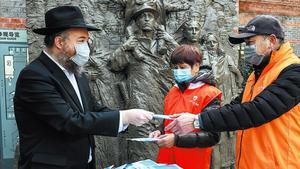Editor's note: In this new series, we share stories and experiences showing how expats are dealing with the novel coronavirus pneumonia outbreak.
 Rabbi Shalom Greenberg donates masks to a neighborhood community near the Shanghai Jewish Refugees Museum, on Feb 3. (TAO LEI / FOR CHINA DAILY)
Rabbi Shalom Greenberg donates masks to a neighborhood community near the Shanghai Jewish Refugees Museum, on Feb 3. (TAO LEI / FOR CHINA DAILY)
A Jewish rabbi donated more than 16,000 surgical masks to sick children and disabled and elderly people in Shanghai to support its fight against the epidemic and because of the city's historical welcoming of Jewish refugees.
Rabbi Shalom Greenberg, 48, and his wife have lived in Shanghai since 1998. They are the founders and directors of the Shanghai Jewish Center, which now serves more than 2,000 Jews living and working in the region.
When the epidemic began, Greenberg and others in the Jewish community noticed long lines of people waiting outside pharmacies to buy surgical masks for protection. "We know there are people who can't stand in line-the disabled and senior citizens," he said.
He decided to help and contacted his friend Chen Jian, director of the Shanghai Jewish Refugees Museum, asking if museum volunteers would help deliver masks to elderly and disabled people in the nearby neighborhood and elsewhere.
On Feb 3, Greenberg took the 10,000 masks he managed to acquire with the help of the Jewish community to the Shanghai Jewish Refugees Museum.
The museum, was originally the Ohel Moishe Synagogue, center of the Jewish ghetto in Shanghai after the city opened its doors to thousands of Jewish refugees escaping Nazi persecution during World War II.
During World War II, most turned a deaf ear to Jews trying to escape the merciless persecution and killings carried out by the Nazi regime. More than 20,000 found refuge in Shanghai.
"As director of the Jewish center, I welcomed many of them who visited Shanghai in the last 20 years," Greenberg said. "They all told me again and again when they came to Shanghai that they were welcomed... by the local Chinese community. That brought them back their dignity as human beings, and for that they were so grateful and would always be grateful for it.
"So for us, Shanghai symbolizes this kind of approach toward people in need, in time of need," he said. Many years ago, "these people, the elderly people that were then children, they and their families were very welcoming and friendly to our people, so this is our time to contribute back to the same people," the rabbi said.
Today the neighborhood near the Shanghai Jewish Refugees Museum is home to many elderly people, according to museum director Chen. "When we knocked on their doors and offered the masks, some told us that was exactly what they needed," Chen told China Daily.
Several days later, the center received more than 5,000 children's masks, and they were contributed to the Children's Hospital of Fudan University.
"A few days later we received more masks from members of the Jewish community, and we donated them to elderly people in other neighborhoods in the city," Greenberg said. "This is just natural for the Jewish community to offer support at this time. What people are doing in China is extraordinary," he said. "Extreme measure for extreme times."
Greenberg said the Chinese people are more united by the situation. "They come together and make the effort to fight the virus and bring China back up to the strength it had before. It should not only help to combat this virus, but to step forward. But it is not only about economic strength. It's also the strength of the people uniting more and coming together, more of the communities coming together now. This will stay much longer after the virus," Greenberg said.


